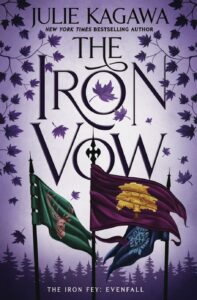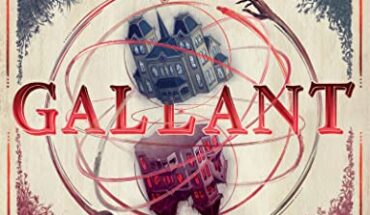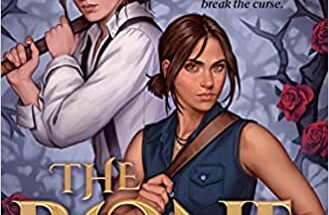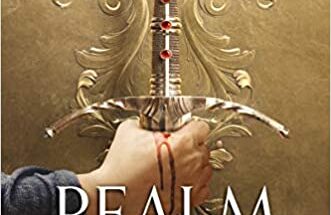 In 2010, we first followed Meghan Chase into Faeryland on a journey to retrieve her kidnapped brother in the YA fantasy, The Iron King (Harper Collins). Now, 12 years later, we will follow her a final time with The Iron Vow, the last installment in Julie Kagawa’s ten-book, four-novella saga.
In 2010, we first followed Meghan Chase into Faeryland on a journey to retrieve her kidnapped brother in the YA fantasy, The Iron King (Harper Collins). Now, 12 years later, we will follow her a final time with The Iron Vow, the last installment in Julie Kagawa’s ten-book, four-novella saga.
If you’ve read the series, you’ve made many friends over the years, from talking grumpy cats to princes of ice to jesters of the Summer Court. And you’ve encountered plenty of lore—from recaps to sidhes to druids and Shakespearian figures, like Oberon and Titania. But it all started with a girl.
I first read The Iron King in 2018, which might seem late to most, but I was only 5 when it originally came out. I was immediately enthralled—with the story, with the magic, and especially with the vibrant character Puck, who was pulled right out of a Shakespearean tale and brought to life in a way I hadn’t imagined before. I read it and re-read it (six times, I’ll admit, at this point). As a young girl, the novel became a comfort story for me during difficult times—and so much more. It truly sparked my passion for the fantasy genre—a story that made me want to be a writer.
The Iron Fey series defined my youth, and inspired me to take the first steps toward to putting my own stories on paper. It feels surreal in some ways to know that the final book is coming out around the same time I become an adult and prepare to head off to college. We all have books that shape our childhood—books we love because we remember how it felt the first time we read them. Books that stay with us. The Iron Fey series is that to me.
The Iron Vow comes out May 9, 2023.
After leaping through the portal to Evenfall, Meghan and her companions find themselves in a terrifying new world where Nightmares roam and glamour is nearly nonexistent. As their magic wanes and the creatures of Evenfall rise against them, the race to find the Nightmare King grows ever more desperate. But what they discover—about Evenfall, about the Nightmare King, about themselves—will shake everything they thought they knew to the core. A world hangs in the balance. And as twilight descends upon all the realms of Faery, Meghan and her allies must make one more impossible choice.
It was such a thrill for me to talk with international and New York Times Bestselling author Julie Kagawa—and my honor to share the discussion with you.
Hadley: How do you remember and organize all the lore and constructs of the Iron Fey world? How do you ensure you remain true to the world you’ve built, even across so many novels and character arcs?
Julie: It does get a little daunting after a bit, lol! I never thought the Iron Fey world would get so huge, and it’s been a bit of a challenge, especially in this third series, coming up with new and exciting places when so much has already been explored. But I do have a fairly good memory when it comes to the worlds and places I’ve written, and if I don’t fully remember something, I can always go back and re-read what is there. (I’ve had to do that a few times, actually.) Making sure all the worlds are consistent is a challenge, but it helps that this is the Nevernever, where everything is magical and just a little bit surreal. Puck has said it himself a couple times: “Sometimes, nothing makes sense in Faery, and that’s okay.”
You draw inspiration from and incorporate other works and characters into your writing, such as Puck, from A Midsummer’s Night Dream; and Grimalkin who draws, in part, from the Cheshire Cat. Are there other folk tales or stories you studied or borrowed from over the years while writing this series?
Many legends, stories, and fairytales have made it into the Iron Fey series. The story of the changeling, for example, where a fey switches a human child with a faery doppelganger, has always fascinated me. Tales of phouka, redcaps, kelpies, bogies, gremlins, and many more have all been a huge influence, and were what made writing the Iron Fey series so fun.
The Iron Fey saga has featured so many legendary characters over time. How do you craft them in such a way that they feel special and memorable in their own right (which they do!)? Additionally, who has simply been the most fun to write?
When dealing with a large cast, I try to give each character their own special thing. Puck, has his humor, for example. Ash is much more serious and broody, and Grimalkin has his “I am a cat” expression. As for who has been the most fun to write, it’s kind of a toss up between Ash and Puck. Yes, Puck is fun and snarky, and I love writing witty comebacks, but Ash is an amazing swordsman and he has that dangerous, wounded, overprotective attitude that I adore. Really, I have the most fun when those two are together; their banter with each other makes me smile.
When, after writing The Iron Warrior in 2015, did you realize that the Iron Fey saga was not wholly complete? Did you always know the tale would someday continue, or did an idea suddenly strike you as the ending you knew you had to write?
I always had the feeling that I would probably come back to Meghan, Puck, and Ash after The Iron Warrior was finished. Not because I thought their story wasn’t finished, but because I really love those three and I knew I would want to come back to their world one day. Also, since Keirran was introduced, I knew I had to do something with him, that his story was definitely not over yet.
The Iron Raven was written in Puck’s point of view, and The Iron Sword in Ash’s. If you can tell us, can we expect the last book to be in Meghan’s point of view, completing our original iconic trio?
That is correct. We will return to Meghan’s POV for the final book in the Iron Fey series. And I am super pleased and excited with how the finale turned out. I hope everyone cries—no, bad author! I mean I hope everyone is as happy with it as me. (Evil author chuckle)
What has writing such a long and successful series taught you as a writer? Are there any skills you picked up along the way to share?
That you should always write what is in your heart, what you love, not what everyone else thinks you should write. Not everyone will like your book, some will actively hate it, and that’s fine. You can’t make everyone happy, so you should always write the thing that will make you happy.
Lastly, what is a piece of valuable writing advice you received that you could share with an aspiring young writer like me?
Persist. Always persist. Writing is a skill that only improves if you practice. If you want to be traditionally published, you are going to be rejected, maybe numerous times. That’s just part of being a writer. Remember that all authors started exactly where you are right now, unpublished and unknown. The only difference between an aspiring writer and a published author is that the author never gave up.
You can pre-order The Iron Vow now at your local independent bookshop.
Julie Kagawa is the international and New York Times bestselling author of the Iron Fey, Blood of Eden, Talon, and Shadow of the Fox series. Born in Sacramento, Julie has been a bookseller and an animal trainer. She enjoys reading, painting, playing in her garden, and training in martial arts. She now lives in North Carolina with her husband, two obnoxious cats, and a pair of Australian Shepherds who have more Instagram followers than she does.



